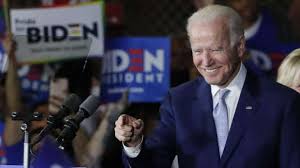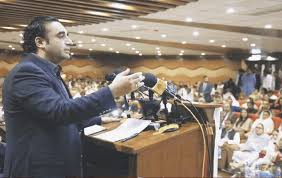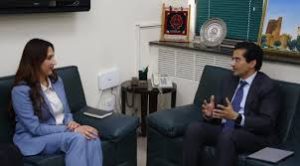Biden emerges as apparent Democratic presidential nominee

New York: Former US Vice President Joe Biden has became the Democratic Party’s presumptive nominee after Senator Bernie Sanders, an avowed socialist, ended his presidential run, setting up Biden to face President Donald Trump, a Republican, in the November election.
Biden, 77, will now have to find a way to take on Trump in the shadow of the coronavirus pandemic, which has made open campaigning impossible and has grabbed the public’s attention away from the 2020 race.
Sanders called Biden a “decent man”, but did not explicitly endorse him. He has said consistently he would endorse the Democratic nominee if he did not win the primary.
“Sanders’s withdrawal from the race concludes a quest for the White House that began five years ago in relative obscurity but ultimately elevated him as a champion of the working class, a standard-bearer of American liberalism and the leader of a self-styled political revolution,” The New York Times commented.
“I want to express my deep gratitude for helping to create an unprecedented grassroots campaign that has had a profound impact on our nation,” Sanders said in a live streamed address to his followers. “Together we have transformed American consciousness as to what kind of nation we can become.”
While Sanders explicitly conceded the presidential nomination to Biden, he also said he would remain on ballots and continue to collect delegates so that he could push the Democrats closer to his vision.
“I will stay on the ballot and continue to gather delegates,” Sanders said. “But Vice President Biden will be the nominee. We must continue working to assemble as many delegates as possible at the Democratic convention, where we will be able to exert significant influence over the party platform and other functions.”
Biden, who will need to motivate young and progressive voters to turn out in November, promised Sanders’s supporters that he would focus on the issues championed by the senator, including fighting climate change and income inequality, and fixing the social safety net.
“I see you, I hear you, and I understand the urgency of what it is we have to get done in this country,” he said. “I hope you will join us. You are more than welcome. You’re needed.”
Sanders had endured a string of losses since Super Tuesday on March 3, giving Biden an all but insurmountable lead in delegates. Yet in mid-March he showed little obvious desire to step aside.
Biden has earned more than half the nearly 2,000 delegates needed to secure the nomination, making it nearly impossible for Sanders to have caught up in the nominating races ahead.
Former President Barack Obama has spoken with Sanders and other 2020 Democratic presidential candidates in recent weeks about positioning the party to win in November, according to media reports. The former president and the former candidates, including Sanders, agreed that winning in the fall was paramount, these reports said.
By late March, the pandemic all but paralyzed the Democratic race. Most of the states that still had primaries on the calendar were moving to mail-in balloting and the candidates were unable to campaign except through television interviews and live-streams.
Americans’ interest in the campaign waned as well, as the crises in both public health and the economy weighed on their minds.
Trump tweeted that Sanders’s candidacy had been crushed by the Democratic Party and invited the senator’s followers to join the Republican Party, which shares a dislike for trade agreement.
Sanders’s campaign was built around some of the most progressive proposals in US political history, including his centerpiece Medicare for All plan to abolish all private insurance and create a government-run healthcare system.
His agenda, which was largely also supported by Elizabeth Warren, pushed the Democratic Party to the left. Biden has already adopted versions of some of Sanders’s ideas such as free public college tuition in a bid to appeal to Sanders’s supporters.
Sanders was the top fundraiser among Democratic candidates, bringing in $169 million through the end of February, with 58% of that amount coming from donors who contributed $200 or less. Biden had raised $88 million, Federal Election Commission filings show, with small-dollar donors providing 35% of his money.
Sanders’s decision to step aside is a marked change from 2016, when he took the primary battle against Hillary Clinton until June, just as Clinton did with Barack Obama in 2008.
A Democratic primary contest that in mid-February had Sanders as the clear front-runner slipped away from the senator in surprisingly quick fashion.
Sanders scored a strong performance in the first contest in Iowa, and followed up with wins in New Hampshire and Nevada. But an overwhelming defeat to Biden in South Carolina on Feb. 29 was followed by a dismal showing on Super Tuesday, when he won just four of the 14 states holding contests.
Those losses were compounded by others on March 10, including in Michigan, which Sanders had envisioned as a firewall.
Sanders failed to attract African-Americans, who form an essential constituency for any candidate seeking the Democratic nomination, to his campaign. In the Mississippi primary on March 10, Biden won 86% of the black vote, while in South Carolina, the former vice president won almost two-thirds of black voters.
Sanders’s campaign was stalled in October, when he suffered a heart attack. The incident, which the campaign first called chest pains, was the first time a candidate experienced a potentially life-threatening health incident while campaigning for a major party’s presidential nomination.
At 78, Sanders was the oldest candidate in the race and the health scare led to doubts about his fitness to serve, even though he said he had fully recovered and resumed a full slate of campaign activities.
Among the presidential candidates, Sanders was most forceful in denouncing India’s annexation of Jammu and Kashmir in August last and the subsequent lockdown of the state.
India’s action is unacceptable,” Sanders told the annual conference of the Islamic Society of North America.
“The communications blockade must be lifted immediately, and the United States government must speak out boldly in support of international humanitarian law and in support of a UN-backed peaceful resolution that respects the will of the Kashmiri people.”





